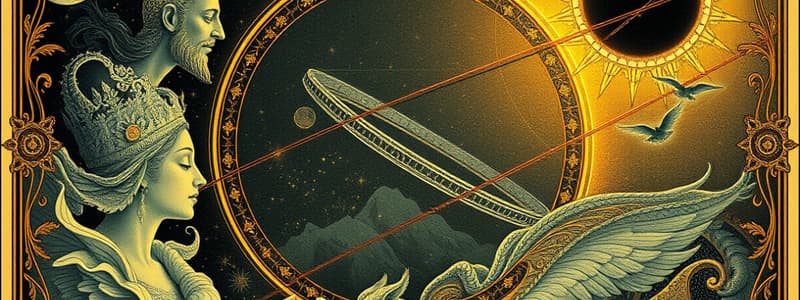Podcast
Questions and Answers
What occurs during a total solar eclipse?
What occurs during a total solar eclipse?
- The Moon casts a partial shadow on Earth.
- The Earth blocks the Moon's light.
- The Moon completely blocks the Sun's light. (correct)
- The Sun appears as a ring around the Moon.
Why are solar eclipses considered rare events for specific locations on Earth?
Why are solar eclipses considered rare events for specific locations on Earth?
- The Sun moves too quickly for proper observation.
- Eclipses happen only during specific seasons.
- Total eclipses occur once every year.
- The Moon's shadow is relatively small. (correct)
Which type of solar eclipse allows a ring of sunlight to be visible around the Moon?
Which type of solar eclipse allows a ring of sunlight to be visible around the Moon?
- Annular eclipse (correct)
- Partial eclipse
- Lunar eclipse
- Total eclipse
What is the best way to safely view a solar eclipse?
What is the best way to safely view a solar eclipse?
During which lunar phase does a solar eclipse occur?
During which lunar phase does a solar eclipse occur?
Flashcards are hidden until you start studying
Study Notes
Solar Eclipse Overview
- A solar eclipse occurs when the Moon aligns between Earth and the Sun, blocking sunlight.
- This phenomenon takes place during a new moon, characterized by a linear arrangement of the Sun, Moon, and Earth.
Types of Solar Eclipses
- Total Solar Eclipse: The Moon fully covers the Sun, casting a shadow on Earth and causing temporary darkness.
- Partial Solar Eclipse: The Moon obscures only part of the Sun, allowing some sunlight to reach Earth.
- Annular Solar Eclipse: The Moon is at a greater distance from Earth, resulting in a ring of sunlight surrounding the Moon.
Frequency and Visibility
- Solar eclipses are infrequent for specific locations due to the small size of the Moon's shadow relative to Earth.
- Only particular geographical areas experience a solar eclipse at any given time.
Safety Precautions
- Viewing a solar eclipse requires appropriate eye protection, such as eclipse glasses or pinhole projectors.
- Directly looking at the Sun, even during an eclipse, can lead to irreversible eye damage.
Studying That Suits You
Use AI to generate personalized quizzes and flashcards to suit your learning preferences.




